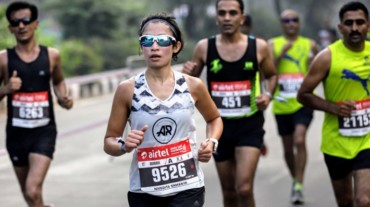Now that you’ve got made up your thoughts to take part within the subsequent marathon, it’s time to give up being a sofa potato and begin coaching – HARD! A marathon will not be your common run, so it wants some preparation before you determine on ending the run.
Your physique can endure a lot should you don’t practice effectively. Many runners neglect to concentrate to their routines, however as each runner is conscious that physique will make noise when there’s a downside. Your ft additionally want consideration whereas coaching for a marathon. After all, your ft would be the solely connecting level between your physique and the bottom (hopefully!), it is important to ensure that your physique is powerful sufficient to avoid accidents and you’ll not endure when you might have to run greater than 20 km in a single go.

Health Shots reached out to Dr Rajat Chauhan, Student of Pain & Running (Life); Advocate of GOYA (Get Off Your Arse); Founder of La Ultra and Author, to know extra about frequent operating accidents individuals face whereas coaching for a marathon and what you are able to do about it.
Common accidents to look out for
Here are a few of the frequent accidents you need to look out for, in accordance to Dr Rajat Chauhan.
1. Knee ache
One of the most typical accidents individuals face throughout a run is knee ache. People who’ve been inactive for many of their life and all of a sudden determine to begin operating are probably the most weak to knee ache.
2. Shin ache
Shin ache can also be a quite common harm that may happen whenever you strive to construct your distance too quick.
3. Heel ache
Medically often known as plantar fasciitis, heel ache is one other frequent harm individuals ought to look out for.
4. Lower again ache
When you land heavy, your again, knee, shin and heel – all the pieces hurts. Hence, you need to pay extra consideration to your operating kind and the way you land.
5. Iliotibial band (ITB) syndrome
Iliotibial band or ITB is when the skin of the knee or the thigh pains. Stretching the ITB is the one approach to strengthen the muscular tissues and enhance flexibility.
Tips to avoid accidents whereas coaching for a marathon
Show some love to your physique by incorporating some easy but efficient methods that may enable you to avoid accidents. As Dr Chauhan says. “You need to build a solid base to get the mileage in, get your kilometres inf so that your base is formed and you don’t get injured easily.”

1. Start coaching not less than a few months prior
Not coaching effectively sufficient can put you prone to accidents by not coaching and speeding into a marathon. What you want is ample time to put together your physique. Dr Chauhan says, “At least 2-3 months of practice is required for a 5-10 km run. 4 months should be enough for a half marathon (21 km) and 6 months for a full marathon (42 km).”
2. Choose your tempo, don’t rush
“When you begin running, don’t do trail running because with every second step your ankle twists. Start with running on a road, soft ground, or a park,” recommends the professional.
“Too many people put too much effort when they begin. Begin your journey by running slow and smooth. You should be able to land smoothly. When you are running slowly and smoothly, you put less pressure on your body. You should be calm and relaxed when you run,” advises Dr Chauhan. “If you are trying to increase your distance too soon or run too fast, your body may not recover properly. this can increase your chances of getting injured.”
3. Strength coaching
Highlighting the significance of energy coaching, Dr Chauhan explains that most individuals don’t energy practice. “They fail to understand that running involves your muscles, joints and bones. Strength training reduces the chances of injuries to quite an extent.”
4. Stretches
“Stretches are important, but they do not need to be a one-hour-long activity. Do hips and lower back stretches – those are the bits that need to be stretched to avoid injuries,” explains Dr Chauhan. He additional emphasised the significance of doing heel raises to strengthen the calf muscular tissues. Toe curls are one other, he suggests might help runners.
5. Nutrition
Tale as outdated as time – what you eat is what you’re! Nutrition is equally as essential for runners as it’s for some other sport. Physiology comes into play right here, says Dr Chauhan. “If you are not taking care of nutrition, then you are not taking care of strength, and your body is not recovering enough. Injuries will happen when you start doing longer marathons.” So be sure you eat a wholesome and nutritious weight-reduction plan.
6. Sleep
Another important factor that helps strengthen your physique is sleep. Dr Chauhan explains that that is the time when your physique recovers. “If you are not recovering well, your body will be tired from the previous day. A hormone called melatonin is released at night and is vital to recovery.”

7. Running footwear
Dr Chauhan suggests a easy but efficient technique to select the precise footwear for a marathon. “Go to a brand, try a few pairs and see what fits well. Then go to another brand, do the same and then go to the third brand. Then shortlist the ones you like. Revisit those brands. The right shoe is the one that feels like the perfect fit.”
Another factor you need to remember is your “running shoes should be slightly bigger than the casual or regular shoes that you wear. Your shoes tend to expand when you keep running so there needs to be some space for it to grow.” It is essential to select the precise footwear and socks for your security and to avoid accidents.
8. Drink water, don’t overhydrate
“Water intake is important, but don’t overdo it,” says Dr Chauhan. He additional explains that “overhydration can be more fatal than dehydration. Don’t drink a litre of water everywhere you stop during a marathon. Drink when you are thirsty.” He recommends 2-3 sips of water each time you’re feeling thirsty to avoid overhydration.





